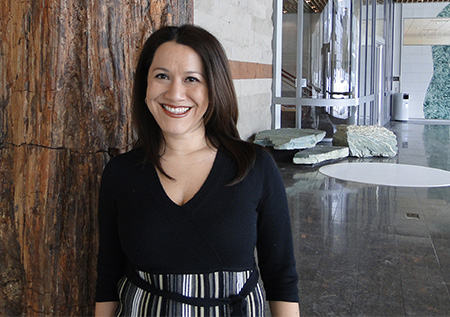
When she was a little girl growing up in Mexico City, MIT graduate student Claudia Octaviano’s school held regular pollution drills. During the drills, it was her job to crawl to the windows and seal them with paper towels. The procedure was in place for a good reason—in 1992 the UN described Mexico City’s air as the most polluted on the planet. The city’s air quality has improved since then, but the experience left a lasting impression on Octaviano.

“We had drills for earthquakes and also drills for air pollution. It’s funny—it left me with the idea that pollution is a really serious problem, on the same level as earthquakes,” says Octaviano, who will receive a doctoral degree from MIT’s Engineering Systems Division this spring.
As she grew older, Octaviano, also a research assistant at the Joint Program on the Science and Policy of Global Change, began to think about how economies develop. She became especially interested in how countries can grow their energy systems in ways to avoid issues like the poor air quality that plagued Mexico City during her childhood.
Saving energy for a rainy day
Octaviano is now studying how energy storage technologies could transform the economics of renewable energy. Storage technologies, like batteries or pumped hydroelectric storage, could be used to counter the intermittency issues inherent in low-carbon power sources like wind and solar, if it were economically feasible to do so.
For example, Mexico has strong wind and solar resources, but as in any location, the times when the wind is blowing and the sun is shining don’t necessarily match up with when people use the most electricity. To counter this, renewables must be supported by some sort of backup generation that can quickly come online, often natural gas.
“If storage developers can lower the cost of the technology to where it becomes economical, then it could change how the energy system operates,” says Octaviano. “We wouldn’t only be thinking about natural gas as the backup for renewables. They could be assisted by storage instead.”
In theory, any energy storage technology could provide this service, but at present most technologies are too expensive to play a large role in the energy market. Octaviano’s doctoral thesis estimates the value of energy storage in Mexico’s energy market, or in other words how much electricity providers would be willing to pay for it. She does this by modeling how much storage would be needed to support large-scale use of wind and solar power.
She is also evaluating the emissions effects of energy storage technologies in Mexico. The benefits are potentially twofold—in addition to enabling more widespread use of renewables, if energy storage becomes a viable backup generation technology, it can eliminate some of the emissions from natural gas.
Creating better future systems
Octaviano’s interest in building better energy systems is the result of firsthand experience. Prior to coming to MIT, she developed air pollution regulations for oil and electricity facilities as the Deputy Director of Electricity and Oil Refining at Mexico’s Ministry of Environment and Natural Resources.
Part of Octaviano’s job was to analyze the costs and benefits of potential regulations based on input from Mexico’s stateowned electricity and oil companies, Comisión Federal de Electricidad (CFE) and Petróleos Mexicanos (Pemex), as well as NGOs and academics. During the process, she was struck by the costs resulting from air pollution’s effects on human health and infrastructure.
“I spend a lot of time thinking about how to convince people that these technologies are important and worth investing in,” she says. “And they are, based on the benefits of cleaner air, and how much we spend fixing these problems.”
Working with the parties who would be affected by new regulations, Octaviano saw that many of the problems that now required regulation were created by decisions made decades in the past. The experience made her realize that utility companies—especially state owned ones—didn’t want to pollute. They were keenly aware that new regulations would make things very difficult for them, but they were limited by the resources and infrastructure that were available.
“Decisions made in the past continue to influence us in the present, and the repercussions can be very difficult to deal with,” Octaviano says. “What I want to do with my research is try to make energy systems better so that people don’t have these problems in the future.”
After completing her studies at MIT, Octaviano hopes to return to Mexico to work toward developing and incorporating new technologies into the country’s energy system.
Claudia Octaviano will receive a Ph.D. from MIT’s Engineering Systems Division in Spring 2015. She is also a research assistant at the Joint Program on the Science and Policy of Global Change.

